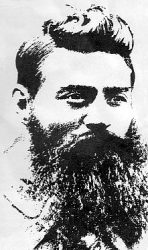 |
An Outlaw and Folk Hero, Ned Kelly is revered by many Australians. Ned was forced into becoming an outlaw by the police who framed him and intended to shoot him without a trail. The common knowledge of the police harassment directed against him and his family, and his subsequent evasion of police capture for years, turned him into a local folk hero. His comments regarding the flood of Orientals into Australia show his appreciation of the dangers of the Asianisation of our country. |
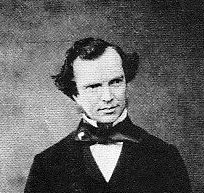 |
A republican patriot and member of parliament, he led his life according to his principles. He worked hard to: 1) achieve a genuine people's democracy, 2) make land available to the ordinary citizen, 3) promote Australianism against imperialism, and 4) keep Australia free from Asianisation. |
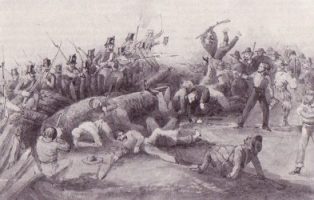 |
The 1854 rebellion of the goldminers at Ballarat due to the petty tyranny of the government administration was an important chapter in our nation's history. Their demands for the end of tyranny on the goldfields and for a representative parliament were met, marking the start of a new era in the development of democracy in Australia. Eureka: Miscellaneous Notes |
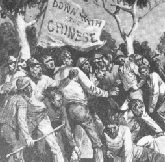 |
The Lambing Flat Rebellion was a series of violent anti-Chinese demonstrations that took place around the Lambing Flat (now Young) area of New South Wales. The Miners' Protective League demanded the parliamentary representation, protection of industry, and the expulsion of the Chinese. The Lambing Flat Rebellion was a result of the failure of the Government to listen to the White population, which was strongly opposed to the possibility of the Asianisation of Australia. It was this rebellion which provided a strong impetus for the development of laws against further Chinese immigration; leading Lambing Flat to be described as "the shrine of White Australia". |
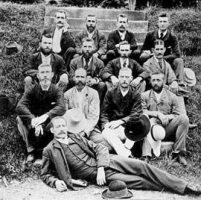 |
The 1891 Shearers' Strike, during the overseas induced depression of the 1890s, was in response to the pastoralists reaction to falling wool prices of intending to reduce the shearers' wages. During the unrest, the colonial administration ordered the arrest of the shearers' leaders on charges of sedition and conspiracy. The eventual failure of the strike broke worker militancy and hastened the call for a political movement to represent the interests of working people. This strike is part of our folkloric and nativist political heritage, and rightly deserves to be celebrated by modern day Australians as part of our unique culture. |
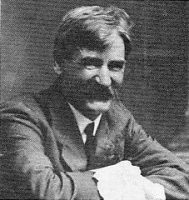 |
Henry Lawson is one of the most famous and most popular of all Australian writers. His work was a strong part in the expression, and development, of the Australian national identity. Besides his cultural Australianism, his works reflect his political ideology, of which three major strands constantly appear in his writings: 1) The promotion of a republic, 2) The belief in a European Australia, and 3) The desire for social justice. |
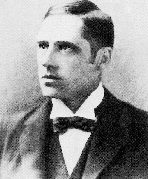 |
A Bush Poet and Nationalist Patriot. Paterson's poetry and stories, still popular to this day, are among the best writings of our national culture, often evoking a strong affection for, and affinity with, the Australian bush and community. His concern regarding Asianisation is revealed in both his prose and poetry. |
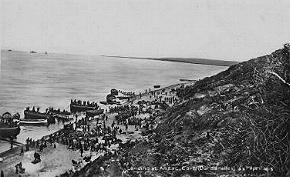 |
Gallipoli was the first time that Australian troops fought together as one (prior to this Australian units had been sent to war on a colony by colony basis). It has been said that it was at Gallipoli that Australians gained a new sense of nationhood; whereby any lingering considerations of ourselves as just Victorians, New South Welshman, Queenslanders, etc, were swept away, to be replaced by one united people: the Australians. The courage, determination and sacrifice of the Anzacs is commemorated here as a significant part of our national culture and identity. The AIF The Diggers |
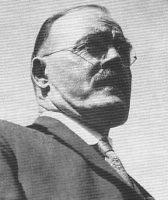 |
Jack Lang was one of the pioneers of Australian independence and a defender of the sovereign right of the Australian people to freedom and dignity. Lang fought the banks in the interests of the Australian people; his legacy is a simple one: put Australia First against the usurpations of international finance and its local hirelings. His views on White Australia and economic independence are the opinions of modern Australian nationalists. |
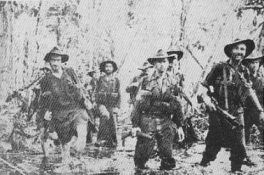 |
This campaign further demonstrated to the world the fighting qualities of Australia's fighting forces. The Battle for the Kokoda Track marked the turning point of the war in the south west Pacific. No longer could the Japanese pose a direct threat to Australia. The fearless courage and heroism of our Diggers during this campaign in the direct defence of Australia will always be remembered with great pride and honour. Kokoda: Background to the battle Kokoda Day: 29th August |